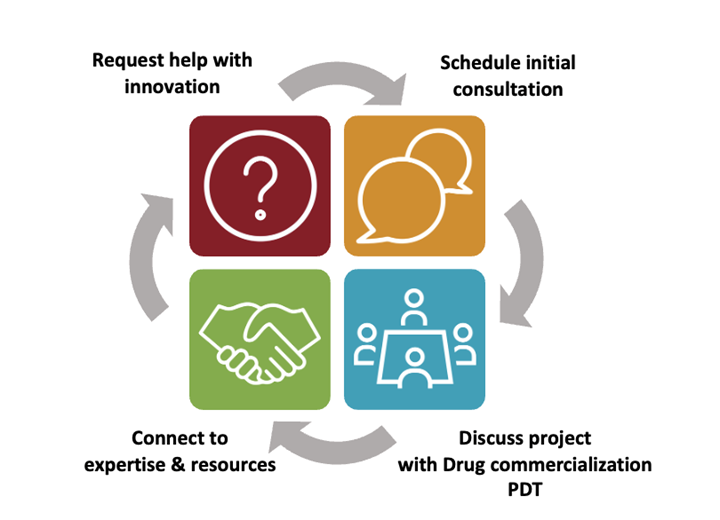
Investigators follow these steps while engaging with the Drug Commercialization PDT.
Benjamin Gaston, MD, had an idea, and he had the science to support the idea. He had a patient population who was likely to benefit from the idea. He even had a name for the idea: “Optate, an airway anti-inflammatory drug with anti-viral properties.”
This treatment would remove excess acid in the airways of children with certain viral illnesses, including COVID. But Gaston didn’t have a clear path to test it in patients. That’s where the Drug Development to Commercialization Project Development Team—sometimes called the “Drug commercialization PDT,” and formerly known as the “Drug Think Tank”— came in.
The Drug Commercialization PDT committee is a powerful resource with a wealth of experience spanning the pharmaceutical industry, academia, and entrepreneurial ventures. With over a century of combined experience, the team navigates the intricate landscape of therapeutic discovery—from initiating projects in academia, licensing technologies, and starting companies to securing investments and overseeing regulatory processes.
Investigators seeking the advice and support of the Drug Commercialization PDT can start by submitting an intake form for the group’s consideration. If accepted, investigators will present their proposals to the group, and the group will offer feedback, guidance, and sometimes funding to help propel their projects forward.
Gaston, who is Billie Lou Wood Professor of Pediatrics at Indiana University School of Medicine, went through this process in spring 2022.
“They were very encouraging, and their feedback was thoughtful,” Gaston said.
The experts on the Drug commercialization PDT panel noted that Gaston’s drug, Optate, had some significant strengths, including its single-dose efficacy. But to take it to the next level, they recommended that Gaston pursue additional studies regarding dosing and toxicology. They also prompted him to develop a plan to submit an Investigational New Drug Application (IND) to the FDA.
The group even provided some funding for these efforts, which Gaston said was crucial.
“Without the support of the Drug Commercialization PDT, we would have had a much slower start to the clinical study,” he said.
Since it was founded in March 2021, the Drug Commercialization PDT has provided this kind of guidance and support to 34 investigators, according to program manager Padma Portonovo, PhD, MBA.
“The Drug Commercialization PDT offers substantial value as a part of Indiana CTSI, making it a compelling resource for investigators in the drug discovery space to learn more about and engage with,” she said.
The group is co-led by Andy Dahlem, D.V.M. (h.c.), Ph.D., of Indiana University School of Medicine, and Rich Taylor, PhD, of the University of Notre Dame. Its nine members have extensive knowledge of the science and the business of drug development. The team prides itself on deep technical knowledge, particularly in medicinal chemistry, drawing from both academic and pharmaceutical industry backgrounds. Beyond molecular and cellular biology, the committee also encompasses expertise in toxicology, metabolism (ADME), regulatory affairs, and a keen entrepreneurial spirit essential for the successful translation of fundamental discoveries into clinical therapies.
Connecting with these individuals can also lead to additional benefits for investigators, said Portonovo.
“Engaging with the Drug Commercialization PDT opens doors to a network of professionals, collaborators, and industry connections,” she said. “This network can prove invaluable for investigators seeking partnerships, collaborations, and insights within the broader landscape of drug development.”
As for Gaston, he and his team have obtained an investigator-initiated IND for single-dose use, and are currently evaluating whether it reduces the symptoms and severity of early COVID infections, he said. That means that Optate is on track for eventual commercialization, and could be making its way to the children who need it sometime soon.
“The more contacts you have, the more feedback you get, the better your chances of success” in navigating the complexities of pharmaceutical commercialization, Gaston said.
The Drug Commercialization PDT, with its deep bench of supportive, knowledgeable and critically engaged experts, is a wonderful “first step” into that world, he added.
“It was good business advice,” he said. “That’s what we all need in this translational space.”
